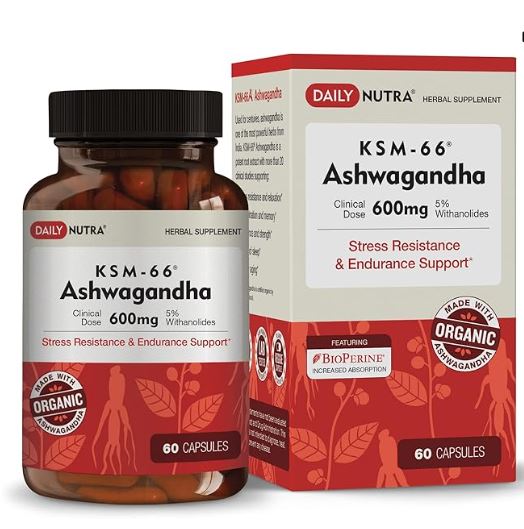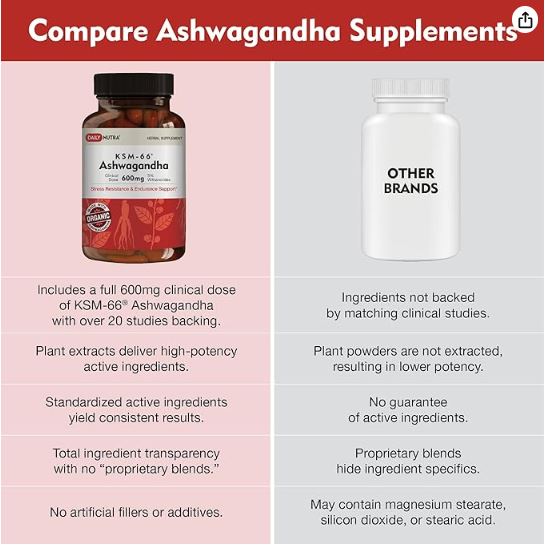Ashwagandha isn’t just another herbal trend — it’s one of the most studied adaptogens in the world. But here’s the thing: not all Ashwagandha supplements are equal.
The extract you actually want is KSM-66® Ashwagandha (sometimes labeled KS-600). This form has been tested in dozens of clinical trials, shown to support stress relief, sleep quality, hormone balance, and even performance. If you’re going to take Ashwagandha, skip the generic powders and gummies loaded with fillers — go for the version that research backs.


What is Ashwagandha and which type works best?
Ashwagandha (Withania somnifera) is an adaptogenic herb used for stress relief, sleep, energy, and hormone balance. The most effective and clinically studied form is KSM-66® Ashwagandha (KS-600), a full-spectrum root extract.
What does it do?
Research shows KSM-66® may lower cortisol, improve sleep, support testosterone and hormones, boost focus, and enhance physical performance.
Is it safe?
Yes, when taken as directed. It’s well tolerated for most healthy adults, but avoid during pregnancy or if you’re on thyroid/autoimmune medications unless guided by a professional.
What Is Ashwagandha?
Ashwagandha (Withania somnifera) is an ancient adaptogenic herb used for over 3,000 years in Ayurvedic medicine to support stress relief, energy, sleep, and hormone balance. As an adaptogen, it helps your body regulate cortisol (the stress hormone) and return to homeostasis—making it one of the most versatile natural supplements available today.
According to WebMD, it’s been used to “relieve stress, increase energy levels, and improve concentration.”
Is Ashwagandha Safe?
For most healthy adults, yes — Ashwagandha is generally well-tolerated and safe when taken at recommended doses. Mild side effects like drowsiness or stomach upset can occur at higher doses. Rare cases of liver issues have been reported, though these are extremely uncommon and often linked to preexisting conditions or excessive intake.
As always, consult your healthcare provider if you’re pregnant, nursing, or managing a medical condition.
Key Benefits of Ashwagandha
Ashwagandha offers a wide range of research-backed benefits, especially for people dealing with stress, low energy, or hormone imbalances. Its adaptogenic properties help the body regulate cortisol and maintain equilibrium in both mind and body.
Benefits include:
- Reduces stress and anxiety by lowering cortisol levels
- Improves focus, memory, and mental clarity
- Promotes deeper, more restful sleep
- Supports hormone balance and steady energy levels
- Aids immune function and adrenal resilience
These are the reasons I include Ashwagandha as a core part of my hormone and stress support routine. If you want to go deeper into how it ties into hormonal health, check out my full guide on Balancing Hormones Naturally.
How to Take Ashwagandha (Capsules, Tea, or Gummies?)
Ashwagandha comes in several forms, but the most common and convenient options are capsules, tea, and gummies.
Capsules (KSM-66 or Sensoril)
- Most concentrated and clinically studied form
- Standardized for active compounds (typically 300–600 mg per dose)
- Best for consistent stress, hormone, and energy support
- Usually taken in the morning or mid-day
Good if: You want maximum potency and reliable results
Brand I use: KSM-66 Ashwagandha Capsules on Amazon
Ashwagandha Tea
- Gentler, great for relaxation or winding down
- Naturally caffeine-free and can support sleep
- Ideal for people who are sensitive to stronger doses
- May be less effective for hormone or energy support on its own
Good if: You’re easing into adaptogens or prefer a calming nighttime routine
Brand I use: My go-to Ashwagandha Tea
Ashwagandha Gummies
Gummies are one of the most popular ways to take Ashwagandha, especially for beginners. They’re easy to take, taste good, and often include added ingredients like vitamin D or zinc for extra benefits.
The most well-known option on the market right now is Goli Ashwagandha Gummies — one of Amazon’s best-selling adaptogen supplements with thousands of reviews. They use KSM-66®, a clinically studied form of Ashwagandha, and include vitamin D for added stress and immune support.
Most people take two gummies per day, which delivers about 300 mg of Ashwagandha — a solid, effective daily dose. Many reviewers report feeling noticeably calmer, more focused, or more relaxed within about 30 to 60 minutes of taking them.
That said, I personally prefer capsules for their simplicity, consistency, and higher potency per serving. Gummies are a great option if you want something convenient and enjoyable — just be sure to check for added sugars or artificial ingredients with other brands.
Recommended: Goli Ashwagandha Gummies on Amazon
Ashwagandha FAQs
1. What is the best type of Ashwagandha?
The most researched and effective form is KSM-66® Ashwagandha (KS-600) — a full-spectrum root extract used in dozens of clinical studies.
2. What are the main benefits of Ashwagandha?
Ashwagandha helps lower stress and cortisol, improve sleep, boost energy, support hormone balance, and sharpen focus. Some studies also show benefits for testosterone and exercise recovery.
3. How long does it take for Ashwagandha to work?
Many people feel calmer within the first week, but bigger benefits like improved sleep, energy, or hormone support usually show up after 4–8 weeks of consistent use.
4. Can Ashwagandha help with anxiety?
Yes. Ashwagandha is widely used to reduce stress and anxiety by calming the nervous system and lowering cortisol. It’s not a replacement for therapy or medication, but it can be a strong natural support.
5. Does Ashwagandha boost testosterone?
Research shows Ashwagandha can support healthy testosterone in men, especially those under stress or doing intense exercise. It works indirectly by lowering cortisol and balancing the stress response.
6. Can Ashwagandha improve sleep?
Yes. It isn’t a sedative, but its stress-reducing effect helps the body relax, making it easier to fall asleep and stay asleep.
7. Is Ashwagandha safe to take every day?
For most healthy adults, yes. Typical doses (300–600 mg/day) are well tolerated. Some mild side effects (like drowsiness or stomach upset) may happen at higher doses.
8. Can you take Ashwagandha long term?
Most studies show it’s safe for up to 3 months of continuous use. Many people take short breaks (a week or two off every few months) to reset tolerance.
9. Who should avoid Ashwagandha?
It’s not recommended during pregnancy, while nursing, or if you’re taking thyroid or autoimmune medications unless cleared by a doctor.
10. Can kids or teens take Ashwagandha?
Not typically. Always consult a pediatrician before giving Ashwagandha to children or teens.
11. Does Ashwagandha interact with other supplements?
Generally safe to combine with vitamins, magnesium, or omega-3s. Avoid stacking with strong sedatives or stimulants without medical guidance.
12. What’s the best time to take Ashwagandha?
Capsules are usually taken in the morning or mid-day for energy and stress, or in the evening if sleep is the goal. Tea and gummies are often used at night for relaxation.
Research-Backed Benefits
Ashwagandha isn’t just a wellness trend — it’s one of the most extensively studied adaptogens in modern herbal medicine. Clinical trials have consistently shown real-world benefits across areas like stress, hormones, energy, and sleep.
Here’s what the research shows Ashwagandha may help with:
- Lowering cortisol and reducing stress-related symptoms
- Improving sleep quality, particularly for people with insomnia
- Supporting testosterone and hormone balance (especially in stressed men)
- Boosting memory and cognitive function
- Enhancing endurance and recovery during resistance training
Most of these studies used a high-quality standardized extract — typically KSM-66®, which ensures consistent potency and results.
Final Thoughts
Ashwagandha isn’t just a buzzword—it’s a well-researched plant with deep traditional roots and powerful modern benefits. Whether you’re trying to lower stress, sleep better, or cut back on caffeine and sugar, this herb can be a gentle, effective addition to your daily life.
I personally use both the KSM-66 capsules and organic tea. They’ve helped me stay focused and relaxed without the crash or fog.
Try it for yourself:
Related Posts from Brundell Co.
- Why Most Multivitamins Don’t Work (And What to Take Instead)
Discover what really matters in a multivitamin and why bioavailability makes all the difference. - Balancing Hormones Naturally: What Really Works (For Men & Women)
Ashwagandha plays a key role in this in-depth guide to hormonal support through adaptogens, minerals, and stress relief. - Best Mushroom Supplements (2025 Review)
Adaptogens like reishi and cordyceps also support stress response — see how they compare to ashwagandha in this roundup. - Parasite Cleanse Guide: What to Use and Why It Works
Did you know chronic stress and poor gut health can be connected? This cleanse guide covers how to reset your system from within.
Disclaimer: This content is for informational purposes only and is not medical advice. Always consult a qualified healthcare provider before starting any new supplement, especially if you are pregnant, nursing, have a medical condition, or take medication.
Key Research:
- WebMD – Ashwagandha: Uses, Side Effects, and More
- Chandrasekhar et al. – Indian Journal of Psychological Medicine (2012)
- Ziegenfuss et al. – Journal of the International Society of Sports Nutrition (2014)
Devin Brundell is the founder of Brundell Co., a wellness platform dedicated to natural healing, lifestyle medicine, and intentional living. He holds a Bachelor’s degree in Business Management from Southwest Minnesota State University (SMSU) and a Bachelor’s in Holistic Health Sciences from Quantum University. Devin is also finalizing certification as a Board Certified Holistic Health Practitioner through the AADP. His mission is to empower others to reclaim health through practical tools, clean living, and purpose-driven change — one intentional choice at a time.

Thank you for your kind words Devin! I am so glad the tea inspired you to do more research! Congratulations on your website! I am excited to support it and watch you grow as you follow your inspired path to seek truth and wellness and ultimately share your findings with the world! Blessings always! I am inspired!
I’m impressed, I must say. Really not often do I encounter a blog that’s each educative and entertaining, and let me let you know, you may have hit the nail on the head. Your thought is outstanding; the issue is one thing that not enough persons are speaking intelligently about. I’m very joyful that I stumbled throughout this in my seek for one thing relating to this.